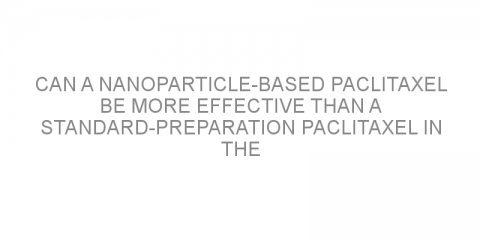In a nutshell The aim of this study was to evaluate the safety of giving stereotactic radiosurgery (SRS) at the same time as other cancer treatments for patients who have brain metastasis. The study found that SRS given in combination with chemotherapy, immunotherapy, or targeted therapy was safe with low levels of side effects. Some background The...
Read MoreLung cancer Posts on Medivizor
Searching for patients to trial an experimental medication for advanced solid tumors.
In a nutshell This trial is aiming to examine the safety and effectiveness of experimental treatment DF6002 alone or in combination with nivolumab (Opdivo) in the treatment of advanced solid tumors, including lung cancer. The main outcomes to be measured are drug toxicity and the response rate of patients to the drug. This trial is being carried out in...
Read MoreCan a nanoparticle-based paclitaxel be more effective than a standard-preparation paclitaxel in the treatment of advanced non-small cell lung cancer?
In a nutshell This trial compared the use of standard paclitaxel (SP; Taxol) versus a new nanoparticle micellar preparation of paclitaxel (NmP) as a first-line treatment for non-small cell lung cancer (NSCLC). The authors found that NmP had better effectiveness and safety in treating NSCLC than SP. Some...
Read MoreEvaluating erlotinib plus radiotherapy for stage 3, EGFR-positive non-small cell lung cancer that cannot be surgically removed
In a nutshell This trial was carried to look at the use of erlotinib (Tarceva) with radiotherapy (RT) compared to standard treatment for EGFR-positive non-small cell lung cancer (NSCLC) that cannot be removed surgically. The authors found that erlotinib and RT improved survival without cancer worsening in these patients. Some...
Read MoreDoes continuous nivolumab improve outcomes in advanced non-small cell lung cancer?
In a nutshell This study compared 1-year fixed-duration versus continuous nivolumab (Opdivo) for the treatment of previously treated advanced non-small-cell lung cancer (NSCLC). The authors found that continuing nivolumab beyond a fixed duration of 1-year may improve patient outcomes. Some background NSCLC is the most common form of lung cancer....
Read MoreEvaluating the risk of heart-related side effects in patients treated with immune checkpoint inhibitors
In a nutshell This study evaluated the risk of heart-related (HR) side effects in patients with lung cancer treated with immune checkpoint inhibitors (ICI). Patients with lung cancer were shown to have a higher risk of developing HR side effects when treated with ICIs. Some background ICIs are a type of cancer therapy used to treat a wide variety of...
Read MoreDoes immune checkpoint therapy and radiotherapy combination improve response in treating brain metastasis from non-small cell lung cancer and melanoma?
In a nutshell The study evaluated the timing of radiotherapy (RT) and immune-checkpoint therapy (ICT) on the outcomes of patients with brain metastasis (BrM) resulting from melanoma and non-small cell lung cancer (NSCLC). The authors found that RT and ICT given at the same time may improve response and delay recurrence in these patients. Some background...
Read MoreEvaluating belotecan as an alternative treatment for topotecan for sensitive-relapsed small-cell lung cancer.
In a nutshell This study looked at the effectiveness and safety of belotecan (Bel; Camtobell) and topotecan (Top; Hycamtin) as therapy for sensitive relapsed small-cell lung cancer (SCLC). The authors found that Bel could be used as an alternative to Top for sensitive-relapsed SCLC. Some background SCLC...
Read MoreCan erlotinib be used at a reduced dose to treat EGFR-mutated advanced non-small cell cancer?
In a nutshell This study was carried out to look at the use of a reduced dose of erlotinib (Tarceva) in the treatment of EGFR-mutated advanced non-small cell lung cancer (NSCLC). The authors found that lower-dose erlotinib was as effective as standard dose gefitinib (Iressa) in these patients. Some background NSCLC is the...
Read MoreDoes chemoimmunotherapy have additional survival benefits compared to immunotherapy alone in the treatment of advanced non-small cell lung cancer?
In a nutshell This study was carried out to compare the effectiveness of chemoimmunotherapy (CIT) to immunotherapy (IT) alone for advanced non-small cell lung cancer (NSCLC). The authors found that there was no significant benefit in overall survival with CIT over IT. Some background NSCLC is the most common form of lung cancer. NSCLC is responsible...
Read MoreThe outcomes of first-line lorlatinib versus crizotinib in advanced ALK-positive non-small cell lung cancer
In a nutshell The study compared outcomes of lorlatinib (Lorbrena) with crizotinib (Xalkori) in patients with previously untreated advanced non-small-cell lung cancer (NSCLC) with ALK mutations (genetic abnormalities). The main finding was that patients receiving lorlatinib had longer progression-free survival (PFS) and a higher response in the...
Read MoreSearching for participants with advanced non-small cell lung cancer to trial an experimental therapy
In a nutshell This trial is evaluating the safety and effectiveness of experimental treatment REGN5093 in patients with advanced non-small-cell lung cancer (NSCLC). The main outcomes to be evaluated will be the number of patients who experience side effects, the maximum dose without significant side effects, and response to treatment. This trial is...
Read More














